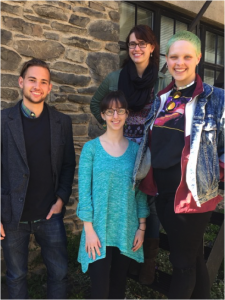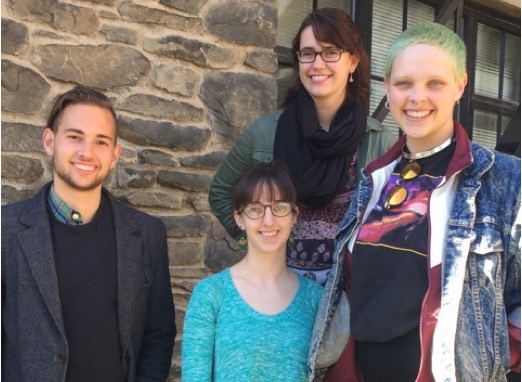For the last nine months, four students at Bard College in New York’s Hudson Valley have been meeting in a basement office on campus. Their mission: to catalyze a nationwide conversation about state-level action on climate change.
Undergraduates Xaver Kandler and Maggie Berke, and environmental policy graduate students Meredith Lavalley and Rebecca Chillrud are the lead organizers for the Power Dialog, a series of climate summits across the country. The week of April fourth, in twenty state capitols, students from over a hundred colleges and universities will be meeting with top state officials in charge of cutting global warming pollution.

State action on climate is critical. “The US is the world’s biggest global warming polluter, behind China, and we are the biggest per capita climate polluters.” said Chillrud. “Last December in Paris, for the first time the US and China both pledged to cut global warming pollution. In turn, the US commitment to reduce emissions by 30% by 2030 will depend in significant measure on what happens in state capitols around the country.”
Power Dialogs are scheduled for 20 states, from Alabama to Washington. And in spite of the recent Supreme Court decision putting a hold on new EPA power plant regulations, there is a lot going on. Over 20 states already have in place policies that will get them halfway to the Clean Power Plan by 2030. More than 40 states have recently retired coal plants, and both red and blue states are seeing explosive growth in renewable power. In December, in a surprising bipartisan move reflecting the growing economic clout of renewables, Congress extended tax credits for wind and solar for five years.
Kandler has been helping to organize the NY State event, scheduled for the University at Albany on Tuesday April 5th. More than 250 students will be in dialog with top officials including Richard Kauffman, Chair of Energy and Finance for the Governor and Jared Snyder, Deputy Commissioner, Office of Air Resources, Climate Change and Energy. Kandler says, “We will bring the voice of students and those who will be most affected by climate change in the coming decades.”
“Working for the Power Dialog gave me the opportunity to see the real effort that goes into activism” Berke explained, “Understanding the inner workings of a nationwide effort have made me realize how important it is to build connections amongst like minded students and professors, and figuring out the most effective way to connect us all.”
LaValley was struck by the complexity of the issues surrounding the Clean Power Plan and how important it is to generate discussion, “I was amazed by how many issues feed into the Clean Power Plan and come out if it” said LaValley, “It feels very important to foster these discussions and bring to light different points of view, especially from students.”
Chillrud was grateful for the opportunity to connect with people around the country who share her passion for environmental policy. “Contacting people from state to state and seeing the positive responses was a great feeling that connected me to a larger environmental movement,” she said. “I got to speak to students and faculty members alike, an learned a lot about how to create a large-scale movement around an important issue like state climate action.”
The Bard Center for Environmental Policy, the sponsor of the Power Dialog project nationwide, offers masters of science degrees in Environmental Policy, and recently added a second MS degree option in Climate Science and Policy. Through projects like the Dialog, Bard Center seeks to foster national dialog on leadership action to address the civilizational challenge of climate change. Center Director Eban Goodstein praised the efforts of the student team. “The world is so interconnected now, so that a small group of students can really make a difference on a national scale. Our team helped catalyze serious climate conversations in Alabama and Arizona, Vermont and Virginia, involving over a hundred colleges and universities and thousands of students. Great work.”
Eban Goodstein is Director of the Bard Center for Environmental Policy. Click here to find a Power Dialog near you.

